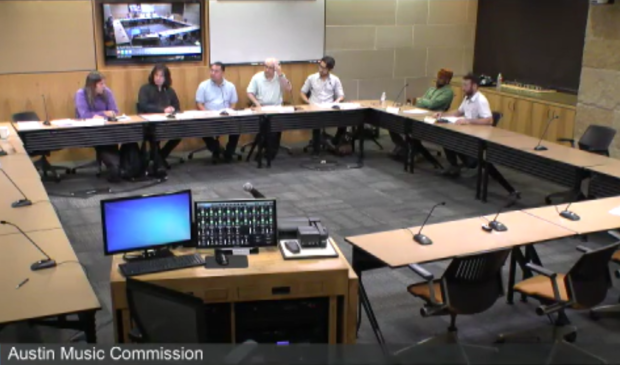Music Commission eyes minority populations in allocating $12M for creative spaces
Friday, June 7, 2019 by
Chad Swiatecki Leaders from the arts and music communities appear to be leaning toward splitting up $12 million in city bond funds for creative spaces based on the city’s racial and gender demographics, in a move to emphasize equity and inclusion.
At Monday’s meeting of the Music Commission, discussion on how the city will opt to spend the bond funds frequently returned to the needs of minority groups that have been historically overlooked in decisions about where the city dedicates its resources.
The roughly 90 minutes of debate came five days before a community input session that will play a large part in determining the needs of various arts groups and the desires of residents regarding how the city will support increasingly marginalized artists.
Among the groups making a push to receive some of the money are supporters of the Emma S. Barrientos Mexican American Cultural Center, who want $2 million to help pay for a theater space in an upcoming expansion of the facility.
Saturday’s community meeting won’t serve as a pitch session for specific ideas on how to deploy the money. Instead, attendees will offer their answer to the question of how they define success related to having more spaces for arts and music groups that are increasingly being priced out of the city.
After Commissioner Oren Rosenthal detailed his suggested criteria for evaluating future proposals for the funding, which included a broad statement about equity and equal benefits for arts and music, Commissioner Jonathan Mahone said the commission should move toward outlining specific percentages or funding minimums for minority communities.
“We should encourage some type of percentage for how much is going to be allocated to historically underrepresented groups and come up with a number, so it’s very clear what we’re talking about,” he said. “Otherwise, because of the way Austin is set up and people have expressed previously, it seems to not work out because there tends to not be leadership and representation in the room representing those groups.”
The funding, which voters approved in November, is intended to provide some relief to the creative community, but members of the arts and music commissions have expressed frustration over how to come up with a recommendation to the city manager and City Council on how the money should be allocated.
Saturday’s forum, which will serve as a joint meeting for both commissions, will lead to a combined working group making a recommendation which will then go for commission-level approvals before heading to the higher levels of City Hall. The bond language had created some uncertainty over what kinds of projects the money can be used for, with some department heads suggesting only city-owned properties would qualify.
Ana Maciel, former chair of the MACC Advisory Board, suggested that she and other stakeholders in the Latino community plan to be vocal in making their case for receiving some of the creative space money after receiving only $26 million toward the center’s $40 million expansion (from a separate stream of bond funding).
“We always have taken what the city of Austin may present to us. When the MACC was told all we could get was $15 million I said we have a master plan telling us we need $30 million to $40 million, so I told the board, let’s vote on pushing for the $40 million,” she said. “If we hadn’t pushed we never would have received the $26 million we got. We constantly have to make sure to let the city know we know what we need, and they don’t tell us what we need.”
Fatima Mann, director of the Community Advocacy and Healing Project, said measures need to be taken to make sure projects that receive bond funding can be sustainable to support artists long term. She also said Saturday’s meeting should include discussion about how the community defines equity in allocating the money.
“I think that ‘equitable’ should be defined by the community and not by this commission,” she said. “While you all are having these community meetings I think these questions should be asked to the community in regards to what does equity look like in this bonding space. That will provide more insight into what the community wants.”
Image courtesy of ATXN.
The Austin Monitor’s work is made possible by donations from the community. Though our reporting covers donors from time to time, we are careful to keep business and editorial efforts separate while maintaining transparency. A complete list of donors is available here, and our code of ethics is explained here.
You're a community leader
And we’re honored you look to us for serious, in-depth news. You know a strong community needs local and dedicated watchdog reporting. We’re here for you and that won’t change. Now will you take the powerful next step and support our nonprofit news organization?










